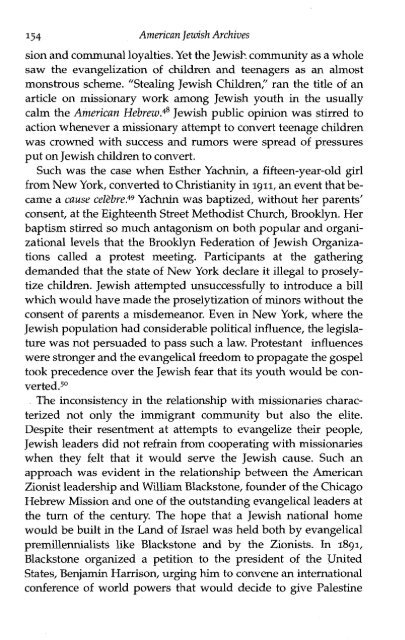You also want an ePaper? Increase the reach of your titles
YUMPU automatically turns print PDFs into web optimized ePapers that Google loves.
154 <strong>American</strong> <strong>Jewish</strong> <strong>Archives</strong><br />
sion and communal loyalties. Yet the JewisE- community as a whole<br />
saw the evangelization of children and teenagers as an almost<br />
monstrous scheme. "Stealing <strong>Jewish</strong> Children," ran the title of an<br />
article on missionary work among <strong>Jewish</strong> youth in the usually<br />
calm the <strong>American</strong> Hebrew.@ <strong>Jewish</strong> public opinion was stirred to<br />
action whenever a missionary attempt to convert teenage children<br />
was crowned with success and rumors were spread of pressures<br />
put on <strong>Jewish</strong> children to convert.<br />
Such was the case when Esther Yachnin, a fifteen-year-old girl<br />
from New York, converted to Christianity in 1911, an event that be-<br />
came a cause celZbre.49 Yachnin was baptized, without her parents'<br />
consent, at the Eighteenth Street Methodist Church, Brooklyn. Her<br />
baptism stirred so much antagonism on both popular and organi-<br />
zational levels that the Brooklyn Federation of <strong>Jewish</strong> Organiza-<br />
tions called a protest meeting. Participants at the gathering<br />
demanded that the state of New York declare it illegal to prosely-<br />
tize children. <strong>Jewish</strong> attempted unsuccessfully to introduce a bill<br />
which would have made the proselytization of minors without the<br />
consent of parents a misdemeanor. Even in New York, where the<br />
<strong>Jewish</strong> population had considerable political influence, the legisla-<br />
ture was not persuaded to pass such a law. Protestant influences<br />
were stronger and the evangelical freedom to propagate the gospel<br />
took precedence over the <strong>Jewish</strong> fear that its youth would be con-<br />
verted.5'<br />
The inconsistency in the relationship with missionaries charac-<br />
terized not only the immigrant community but also the elite.<br />
Despite their resentment at attempts to evangelize their people,<br />
<strong>Jewish</strong> leaders did not refrain from cooperating with missionaries<br />
when they felt that it would serve the <strong>Jewish</strong> cause. Such an<br />
approach was evident in the relationship between the <strong>American</strong><br />
Zionist leadership and William Blackstone, founder of the Chicago<br />
Hebrew Mission and one of the outstanding evangelical leaders at<br />
the turn of the century. The hope that a <strong>Jewish</strong> national home<br />
would be built in the Land of Israel was held both by evangelical<br />
premillennialists like Blackstone and by the Zionists. In 1891,<br />
Blackstone organized a petition to the president of the United<br />
States, Benjamin Harrison, urging him to convene an international<br />
conference of world powers that would decide to give Palestine

















